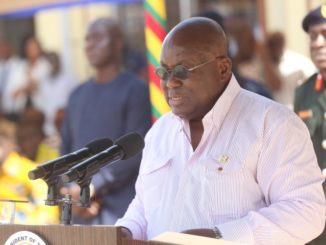The National Identification Authority (NIA) has failed to register the entire population in the Greater-Accra Region within the three to four months deadline it gave when the exercise was launched.
 The exercise, which began at Jubilee House on June 4, 2018, after a one week delay due to technical challenges, has only managed to register 80,817 citizens working in specialised institutions or Key Influencers as the NIA puts it.
The exercise, which began at Jubilee House on June 4, 2018, after a one week delay due to technical challenges, has only managed to register 80,817 citizens working in specialised institutions or Key Influencers as the NIA puts it.
Four months into the exercise, the NIA has not registered a single member of the general population.
Timelines missed
The failure to complete the registration exercise in Grater-Accra within the first specified four months has thrown out of gear all the timelines the authority gave.
This means that the NIA cannot complete the registration of all Ghanaians within the estimated one year promised.
Also, it means that registration of Ghanaians abroad, which was supposed to start six months after the take-off, will also have to be shifted forward.
Registration at specialised institutions suspended
When contacted, Assistant Commissioner of Immigration (ACI), Francis Palmdeti, acting Director of Corporate Affairs at NIA, disclosed that the authority has suspended registration at the selected institutions to prepare for the commencement of mass registration of the general public in the Greater-Accra Region.
According to him, the exercise is likely to start from Adenta in the second week of November where 45 registration centres will operate.
From Greater-Accra, the exercise would move to the Volta, Northern, Upper East, Upper West, Brong Ahafo, Western, Ashanti, Eastern, Western and Central regions in that order.
The exercise is expected to last for two months in the Ashanti Region while one month will be spent on each of the remaining eight regions.
Recruitment of Commissioners of Oaths
The Judicial Service has interviewed over 2500 applicants for the job position of Commissioners of Oaths.
Successful applicants will be trained to serve as Commissioners for oaths during the mass registration phase of the project.
They are expected to cater for persons who wish to be vouched for as citizens eligible to register for the Ghana card.
The exercise, which took place at the Supreme Court Building in Accra, Court of Appeal Complex in Kumasi and the High Court Complex in all the other regions started from October 1 and ended on 12, 2018.
What delayed registration of general public
ACI Palmdeti told The Finder that the delay in recruiting the Commissioners of Oaths was partly to blame for their inability to do the mass registration.
The exercise experienced some teething challenges, which also slowed down the process.
Some registrants arrived at the centres without digital property address, which is a requirement.
In addition, it also turned out that passports presented by several applicants had expired and could not be accepted as a result.
Financial challenges
As a sign of financial challenges facing the authority, some temporary workers of the NIA last week deserted their posts over the non-payment of their allowances.
The workers, who have been engaged since May, 2018, to work on the implementation of the Ghana Card, say they had not been paid for the past two months.
In August 2018, about 300 contract workers of the NIA threatened to lay down their tools over the non-payment of their allowances.
At the time, they said their allowances had not been paid for three months.
The NIA has registered staff of 93 selected State/Public institutions and key personalities in the on-going registration exercise which started on 4th June, 2018.
It has also issued 80,817 Ghana Cards to officials of the said institutions and personalities.
The rollout of the GhanaCard is a collaboration between the NIA and the Identity Management Systems (IMS), a subsidiary of the Margins Group, an indigenous identity, security and transaction solutions provider.
The card would replace the sectorial identity cards in circulation, and shall be the only card to be used in transactions where identification is required as provided by law.
Creation of registration centres
NIA is required to use the polling stations previously used by the Electoral Commission (EC) for the general elections to the extent possible and as far as practicable.
However, because of instant issuance, it is not every polling station previously used by the EC that the NIA will use.
Therefore, NIA has mapped Greater-Accra and scouted areas and positioned the registration centres at places with internet connectivity, to make instant card issuance possible.
For every mobile registration work station, there would be interviewer, an assistant to the interviewer, mobile registration work station operator, and card verification officer.
Persons with the right documents who provide right answers to questions will be issued the instant ECOWAS Identity Card in approximately 30 minutes.
Anyone who wants to register has a duty to provide basic information, and digital address code is one of them.
The primary documents required are a birth certificate or a valid passport. However, existing Ghana Card holders can also use it in place of birth certificate or a valid passport.
This vouching process must be made on oath before a Commissioner of Oath.
The Judicial Service has recruited and is training them to be certified as Commissioners of Oath.
When a citizen has neither of these documents, the person can be vouched for by one relative who has been registered and issued with the card or by two people who are not relatives but who know the person and have been registered and issued ID cards.
Aside the compulsory documents, which can be either a birth certificate or passport, registrants who have all or some of the following documents – drivers licence, Social Security and National Insurance Trust (SSNIT) card, National Health Insurance (NHIS) card, and Tax Identification Number (TIN) number – are required to carry them along.
NIA will make an electronic copy and return them to the owner and NIA would use the electronic versions as part of the person’s identity records purposes of data integration and harmonisation.
The registration exercise for the GhanaCard will involve children from age 0-5, which will provide the country with a unique opportunity for Ghana to sanitise and rationalise her birth certification to ensure social inclusion right from birth.
Ghanaians 15 years and above will be also issued dual interface smartcard.
However, children from zero to 14 would not be issued the same GhanaCard, but with two dimensional derivative (2D) barcode cards, since their biometrics change quickly.
When they attain age 15, they will be issued with the GhanaCard proper.
The new National ID card project is an instant issuance system in place with reliable inter-connectivity that significantly reduces the cost and challenges associated with card distribution.
The new Ghana Card has been designed to assist compatriots with visual challenges to be able to use it, using a tactile feature on the card.
ID Card can be used as passport across ECOWAS
Another new feature of the card is that it has the logos of the passport of Economic Community of West African States (ECOWAS) on it, which allows for it to be used in place of a passport across ECOWAS member countries.
ID card to be linked to one’s bank account
Apart from it being a national identification card, it would also be linked to one’s bank account, to enhance modern payment systems.
The new ID card is expected to have a lifespan of 10 years after which it will be renewable at a fee to be determined by the authority.
–
The Finder



